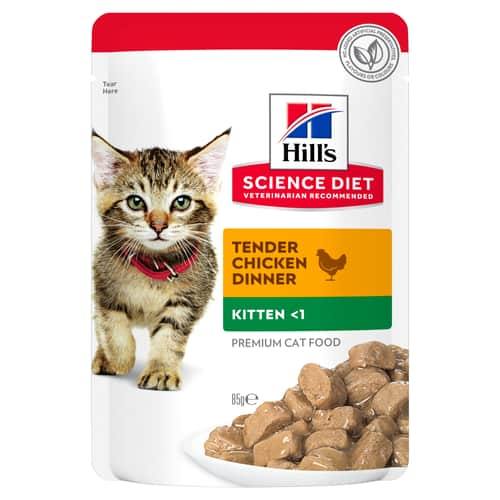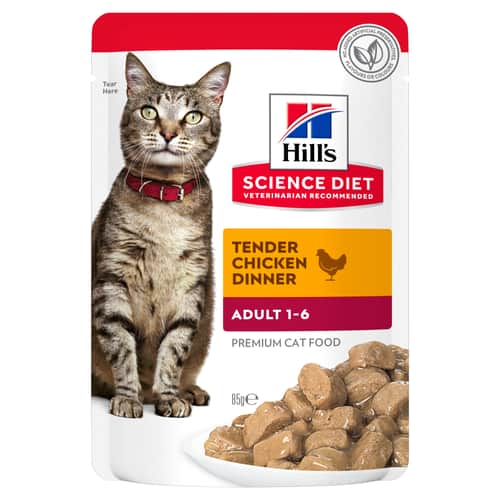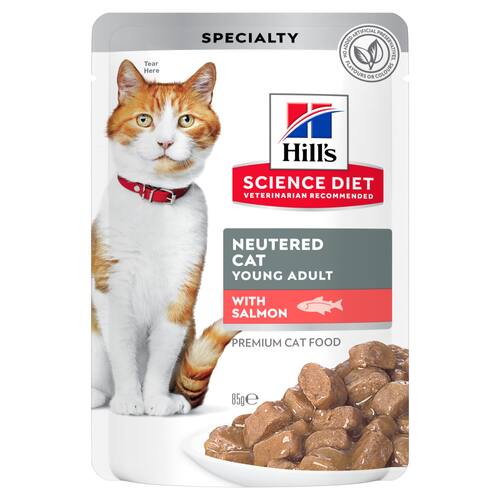
-
Find the right food for your petTake this quiz to see which food may be the best for your furry friend.Find the right food for your petTake this quiz to see which food may be the best for your furry friend.Health CategoryFeatured products
 Adult 7+ Small Bites Chicken Meal, Barley & Rice Recipe Dog Food
Adult 7+ Small Bites Chicken Meal, Barley & Rice Recipe Dog FoodSupports energy level and beautiful coat in mature dogs who prefer smaller kibble
Shop Now Adult Small Bites Chicken & Barley Recipe Dog Food
Adult Small Bites Chicken & Barley Recipe Dog FoodSupports lean muscle for dogs who prefer smaller kibble
Shop Now Adult Oral Care Small & Mini Chicken, Rice & Barley Recipe Dog Food
Adult Oral Care Small & Mini Chicken, Rice & Barley Recipe Dog FoodClinically proven kibble technology to reduce plaque & tartar build-up, specially designed for small & mini dogs
Shop NowFeatured products Kitten Tender Chicken Dinner
Kitten Tender Chicken DinnerWith delicious chunks in a decadent gravy
Shop Now Adult Tender Chicken Dinner Cat Food
Adult Tender Chicken Dinner Cat FoodPrecisely balanced nutrition to support immunity, healthy digestion and lean muscles in cats
Shop Now Neutered Cat Young Adult with Salmon Cat Food
Neutered Cat Young Adult with Salmon Cat FoodPrecisely balanced nutrition with the delicious taste of salmon to meet the needs of neutered cats
Shop Now -
DogCat
- Cat Tips & Articles
-
Health Category
- Weight
- Skin & Food Sensitivities
- Urinary
- Digestive
- Kidney
- Dental
- Serious Illness
-
Life Stage
- Kitten Nutrition
- Adult Nutrition
Featured articlesHill's Australian Bushfire EffortsRead More Pet Food Storage Tips
Pet Food Storage TipsWhere you store your cat and dog food can make a big difference in the quality and freshness once it is opened. Here are some common questions and recommendations for optimal storage for all of Hill’s dry and canned cat and dog food.
Read More Water
WaterWater is the most important nutrient of all and essential for life. Animals can lose almost all their fat and half their protein and still survive, but if they lose 15% of their water, it will mean death.
Read More -


If you're a dog parent, you might find your dog peeing blood at some point. But, while blood in dog urine is a scary sight, it's often treatable. A simple urinary tract infection or a benign prostate problem can be the cause.
Hematuria is the term used to describe when blood appears in a dog's urine when their urinary system, often due to inflammation, an issue with the vessels or a problem with the blood itself. Bleeding can occur either in the upper or lower urinary tract.
Here are common causes of blood in dog urine, what you should do if it affects your dog and the treatments your veterinarian may recommend.
Upper Urinary Tract Causes
As in humans, a dog's upper urinary tract contains two kidneys. Blood in urine originating in this part of the urinary tract tends to affect the kidneys. Causes for bleeding in the upper urinary tract include:
- Idiopathic renal hematuria: This is blood in the urine that results from the kidney for an unknown reason. It could be due to medicine, an infection or an issue with the immune system. This is generally considered a benign condition with a hereditary element.
- Kidney infection: If your dog is peeing blood, one or both of your dog's kidneys could possibly be infected.
- Kidney cancer: While uncommon, kidney cancer can affect dogs and cause blood in dog urine. The cancer can remain in the kidney or spread to other parts of the body.
- Renal telangiectasia: Some dogs, including Welsh corgis, have a genetic predisposition to this spontaneous widening of blood vessels in the kidney, which can lead to blood in their urine.


Tasty Tips
Lower Urinary Tract Causes
The lower urinary tract includes the bladder and the urethra, the tube that connects the bladder to the outside world and allows urine to exit the body. Causes for bleeding here include the following:
- Bladder infection: A lower urinary tract infection (UTI) is by far the most common cause for a dog peeing blood. It can be caused by skin allergies; the anatomy of the urethra, vulva or prepuce; and hormone-related incontinence in spayed females.
- Bladder stones: These can form for a variety of reasons, including genetics, nutrition and chronic infection.
- Bladder cancer: Bladder cancer in dogs often looks similar to a UTI; it can cause accidents in the house, difficulty urinating and blood in the urine.
- Prostate problems: Benign prostate enlargement and prostate infection are the most common prostate problems in male dogs who haven't been neutered.
Causes for blood in dog urine that can affect both the upper and lower urinary tracts include a ruptured bladder, which can happen if they're hit by a car or attacked by another dog; coagulopathy (a scientific word that essentially means clotting problems); and vasculitis, or inflammation of the blood vessels.
Diagnosis and Treatment
If you see your dog peeing blood, contact your vet to make an appointment as soon as possible. As a general rule, any dog peeing blood for the first time should be seen by a vet within 24 hours.
At the visit, the vet will try to diagnose the underlying cause of the blood by analyzing your dog's urine. A urine culture may be recommended to see if bacteria might be causing the issue. They may also conduct a blood test or take an X-ray or an ultrasound.
Treatment depends on the specific cause of the blood. The vet may prescribe antibiotics if the issue is related to bacteria. In cases of benign prostate enlargement and prostate neoplasia, they are likely to recommend neutering. They are also likely to suggest surgery if they find the blood is caused by bladder stones, prostate problems or anatomical irregularities. Vets commonly prescribe anti-inflammatory or pain medicine to ease dogs' discomfort.
Your vet may also recommend a change in food. Nutrition is an important component in preventing and treating urinary tract problems in dogs. Wet foods can help achieve more dilute urine, and certain foods can reduce stone formation and optimize urine pH.
Preventing Future Urinary Problems
Taking your dog for regular veterinary checkups is the best way to prevent blood in their urine and other urinary problems. Your vet can tell you if your dog is predisposed to urinary issues. If they are, the vet can routinely test your dog's urine to make sure they're in tip-top health.
Also, while it may be easy to just let your dog in the backyard to do their business alone, monitoring your dog's urinary habits occasionally is a necessary part of being a dog parent. Letting an issue like blood in the urine persist can lead to more serious consequences. You are your dog's first line of defense to their health, so careful monitoring and discussions with your vet are pertinent. With love and attention, you can help keep your dog happy and healthy.


Dr. Patty Khuly is an award-winning veterinarian known for her independent thinking, her spirited pet advocacy, her passion for the veterinary profession, and her famously irreverent pet health writing.
Dr. K is an honors graduate of both Wellesley College and the University of Pennsylvania School of Veterinary Medicine. She received her MBA at The Wharton School of Business as part of the prestigious VMD/MBA dual-degree program. She now owns Sunset Animal Clinic, a veterinary practice in Miami, Florida.
Related products

Supports energy level and beautiful coat in mature dogs who prefer smaller kibble

Supports lean muscle for dogs who prefer smaller kibble

Supports healthy joints, lean muscle, and beautiful coat for large breed dogs

Clinically proven kibble technology to reduce plaque & tartar build-up, specially designed for small & mini dogs
Related articles

Selecting the right food for your puppy is a key to quality nutrition and a long, healthy life., Learn more about how to select the right puppy food.

Learn how today's wet dog food blends have gotten a face lift, and how you'll provide your dog the nutrition he needs in the form he loves.

Extra pounds can cause problems for your dog's overall health. Learn the signs that your dog might be overweight, and what you can do to manage its weight.

As small and toy breed dogs age, their nutritional needs change.

Put your dog on a diet without them knowing
Our low calorie formula helps you control your dog's weight. It's packed with high-quality protein for building lean muscles, and made with purposeful ingredients for a flavorful, nutritious meal. Clinically proven antioxidants, Vitamin C+E, help promote a healthy immune system.
Put your dog on a diet without them knowing
Our low calorie formula helps you control your dog's weight. It's packed with high-quality protein for building lean muscles, and made with purposeful ingredients for a flavorful, nutritious meal. Clinically proven antioxidants, Vitamin C+E, help promote a healthy immune system.


